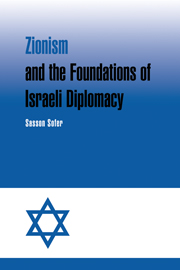Book contents
- Frontmatter
- Contents
- Preface
- Glossary
- Part I Setting the scene
- Part II Appearances and reality
- Part III The fallacies of Realpolitik
- Part IV Sectarian interests and a façade of generality
- 13 The General Zionists
- 14 The farmers and the Sephardi notables
- Part V God's dispositions
- Part VI The boundaries of the intelligentsia
- Notes
- Index
13 - The General Zionists
Published online by Cambridge University Press: 21 December 2009
- Frontmatter
- Contents
- Preface
- Glossary
- Part I Setting the scene
- Part II Appearances and reality
- Part III The fallacies of Realpolitik
- Part IV Sectarian interests and a façade of generality
- 13 The General Zionists
- 14 The farmers and the Sephardi notables
- Part V God's dispositions
- Part VI The boundaries of the intelligentsia
- Notes
- Index
Summary
… They do not know or feel anything which does not serve them directly, which does not benefit them personally.
Binyamin Tammuz, Requiem for Na'amanThe Civil Right was the most divided sector in Zionist politics. Farmers and house-owners, Sephardi notables and central European liberals, artisans and merchants, were united in one front against socialism and for economic interests, but were split on every other issue. The weakness of the centre in Israeli politics has never been resolved; a political Right with a liberal world-view never evolved in Jewish society.
The factions in the centre were known as the Civil Right, although the origin of the name is not clear. Peretz Bernstein, one of its leaders, thought that the term was German in origin, deriving from the traditional distinction between the aristocracy and ordinary civilians. But in conceptual terms it is quite useful for distinguishing the centre from the radical Right, known as the national or Revisionist Right. The history of the Civil Right is distinguished by the extent of its economic power compared with its political weakness. Until the Second World War the private capital which flowed into Palestine was almost six times as great as the capital belonging to public funds. Control over public capital gave the Left unprecedented political advantage. Since private capital is directed to the most profitable use, this fact is of little significance at a time of struggle for national liberation. Most of the construction, commerce and industry of the Yishuv was in private hands, but inevitably the property owned by the Civil Right was fragmented, and the interests of the urban and rural sectors were not necessarily identical.
- Type
- Chapter
- Information
- Zionism and the Foundations of Israeli Diplomacy , pp. 271 - 287Publisher: Cambridge University PressPrint publication year: 1998
- 3
- Cited by

